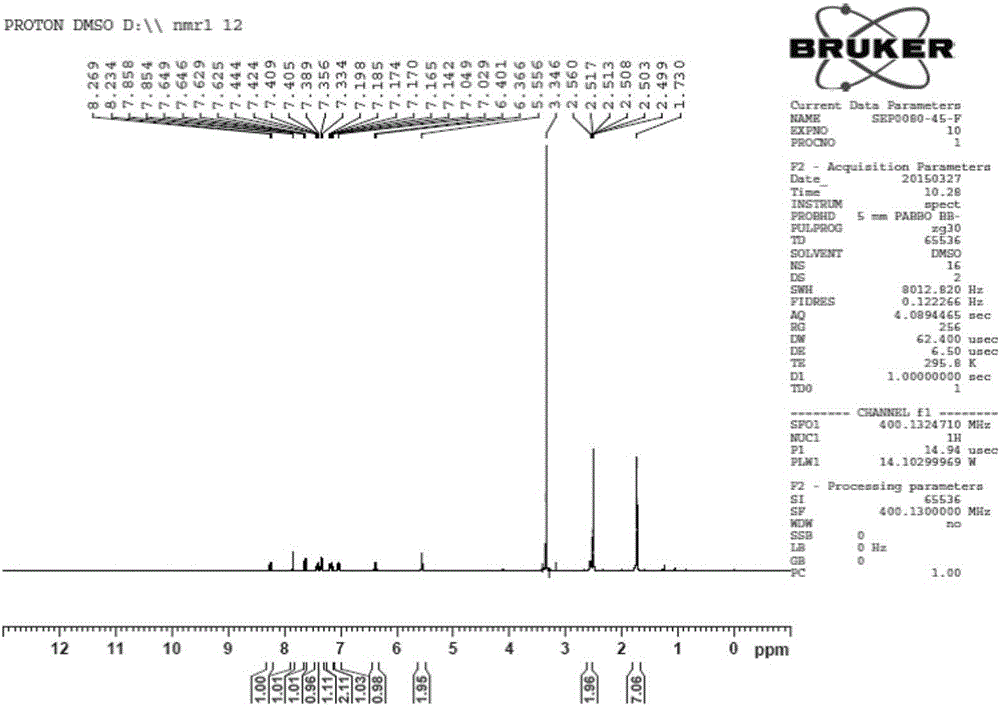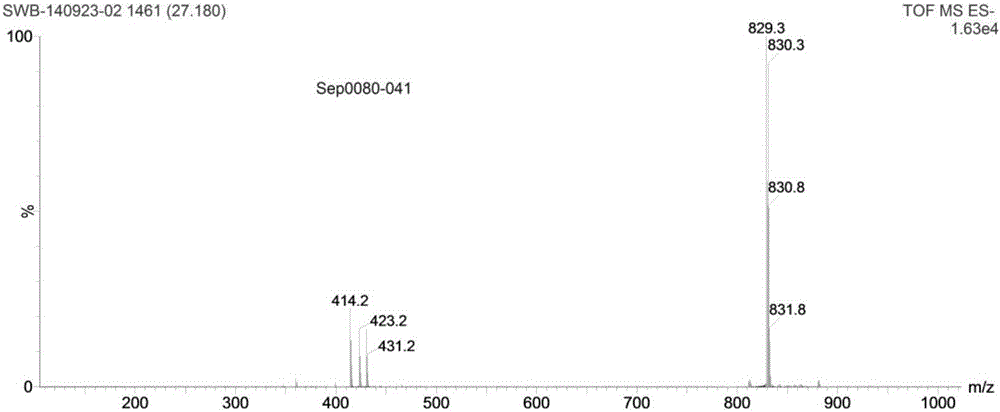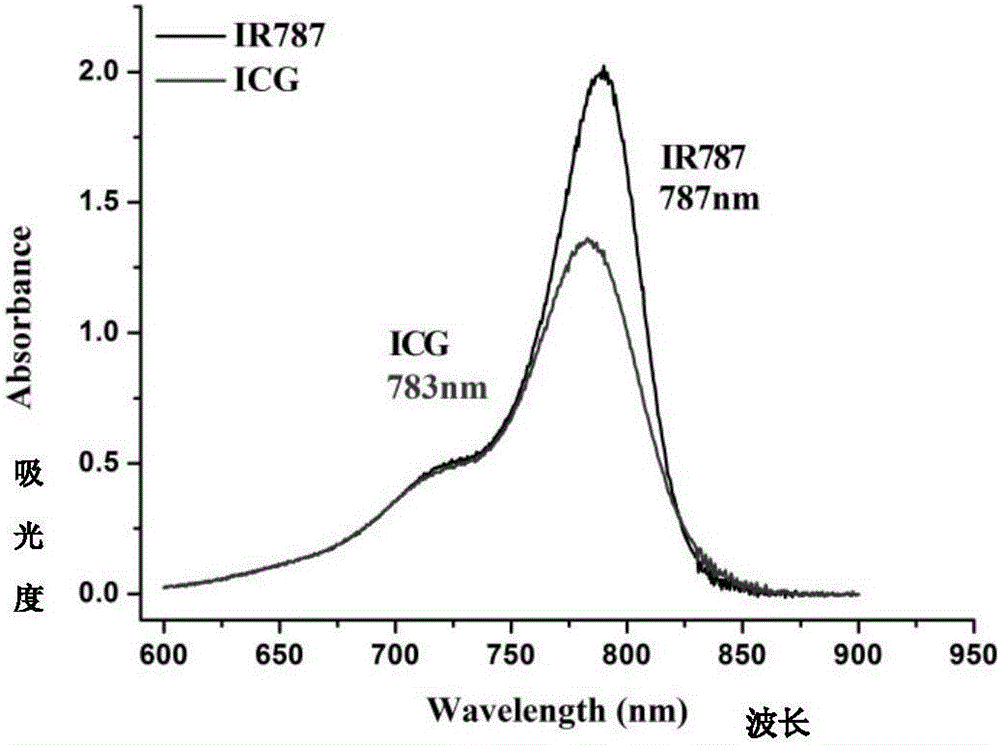Near-infrared fluorescent molecular probe and synthesis method and application thereof
A technology of fluorescent molecular probes and synthesis methods, applied in cell imaging, the field of preparation of molecular probes, can solve problems such as low quantum yield, instability, leakage, etc., to enhance molecular fluorescence intensity, increase Large conjugated system, the effect of increasing the stock displacement
- Summary
- Abstract
- Description
- Claims
- Application Information
AI Technical Summary
Problems solved by technology
Method used
Image
Examples
Embodiment 1
[0036] (1) Add 4.47mmol 2,3,3-trimethyl-3H-indoline-5-potassium sulfonate, 5.81mmol m-fluorobenzyl bromide and 12ml toluene in batches to a 50ml one-necked flask, under the protection of argon 1.31g of 1-m-fluorobenzyl-2,3,3-trimethyl-3H-indoline-5-sulfonic acid, It is a pink solid with a yield of 84.4%.
[0037] (2) Take 2.76mmol 1-m-fluorobenzyl-2,3,3-trimethyl-3H-indoline-5-sulfonic acid, 1.38mmol 2-chloro-1-formyl-2-hydroxymethyl Cyclohexene and 30ml of n-butanol: mixed solvent of toluene (v / v) = 7:3 were added to a 100ml reaction flask, and under the protection of argon, the reaction was heated at reflux at 75°C for 5h. At room temperature, after concentration under reduced pressure, add methyl tert-butyl ether of 3 times the volume of the concentrated reaction solution, filter, and separate and purify the filter cake with column chromatography (silica gel column, the specification of silica gel is 200-300 mesh), and the eluent is A mixed solution of dichloromethane and...
Embodiment 2
[0041](1) Add 4.47mmol 2,3,3-trimethyl-3H-indoline-5-potassium sulfonate, 8.94mmol m-fluorobenzyl bromide and 24ml toluene in batches to a 50ml single-necked flask, under the protection of argon at 90°C for 16 h, cooled to room temperature, filtered, washed with toluene, and dried in vacuo to obtain 1.21 g of 1-m-fluorobenzyl-2,3,3-trimethyl-3H-indoline-5-sulfonic acid, It is a pink solid.
[0042] (2) Take 2.76mmol 1-m-fluorobenzyl-2,3,3-trimethyl-3H-indoline-5-sulfonic acid, 1.38mmol 2-chloro-1-formyl-2-hydroxymethyl Cyclohexene and 20ml of pyridine were added to a 100ml reaction bottle, and under the protection of argon, heated to reflux at 75°C for 8 hours. After the reaction was completed, the temperature was lowered to room temperature, concentrated under reduced pressure, and then added 4 times the volume of the concentrated reaction solution MTBE was filtered, and the filter cake was separated and purified by column chromatography (silica gel column, the specification...
Embodiment 3
[0046] (1) Add 4.47mmol 2,3,3-trimethyl-3H-indoline-5-potassium sulfonate, 11.62mmol m-fluorobenzyl bromide and 24ml toluene in batches to a 50ml one-necked flask, under the protection of nitrogen , reacted at 90°C for 15h, lowered to room temperature, filtered, washed with toluene, and dried in vacuo to obtain 1.28g of 1-m-fluorobenzyl-2,3,3-trimethyl-3H-indoline-5-sulfonic acid, as pink solid.
[0047] (2) Take 2.76mmol 1-m-fluorobenzyl-2,3,3-trimethyl-3H-indoline-5-sulfonic acid, 1.38mmol 2-chloro-1-formyl-2-hydroxymethyl Cyclohexene, 2.76mmol of anhydrous sodium acetate and 20ml of absolute ethanol were added to a 100ml reaction bottle, under the protection of argon, heated at reflux at 75°C for 4h, after the reaction was completed, lowered to room temperature, and concentrated under reduced pressure Add methyl tert-butyl ether of 5 times the volume of the concentrated reaction solution, filter, and the filter cake is separated and purified by column chromatography (silic...
PUM
 Login to View More
Login to View More Abstract
Description
Claims
Application Information
 Login to View More
Login to View More - R&D
- Intellectual Property
- Life Sciences
- Materials
- Tech Scout
- Unparalleled Data Quality
- Higher Quality Content
- 60% Fewer Hallucinations
Browse by: Latest US Patents, China's latest patents, Technical Efficacy Thesaurus, Application Domain, Technology Topic, Popular Technical Reports.
© 2025 PatSnap. All rights reserved.Legal|Privacy policy|Modern Slavery Act Transparency Statement|Sitemap|About US| Contact US: help@patsnap.com



